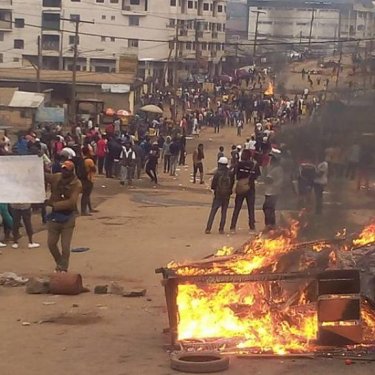Government censors coverage of anglophone minority unrest

Reporters Without Borders condemns the Cameroonian government’s multiple violations of freedom of information amid continuing protests by members of the country’s English-speaking minority.
The government has deprived the English-speaking regions in the northwest and southwest of Internet access since 17 January to prevent the local population from using online social networks to exchange information about the protests.
Cameroon’s anglophones have been staging increasingly angry demonstrations in recent months, saying they are marginalized by the mainly francophone government apparatus and state institutions.
Mobile phone operators have transmitted messages from the Ministry of Posts and Telecommunications warning users not to circulate “false information” on the Internet or on online social networks.
Not content with depriving the English-speaking regions of the means of communication and information, the authorities have banned Cameroon’s traditional media from covering these issues.
In a statement broadcast by national radio and TV on 20 January, National Communication Council president Peter Essoka warned “all national state and privately-owned media from publishing or broadcasting any statement tending to condone secession or federalism on pain of(...) temporary suspension [or] a permanent operations ban.”
In his statement, which has been widely criticized by journalists’ associations and human rights groups, Essoka named seven media outlets that, he said, had been committing these offences.
The communiqué’s many critics include Jean Bruno Tagne, the deputy news director of Canal 2 International, a very popular Cameroonian TV channel. He told Radio France Internationale: “The anglophone crisis is a Cameroonian problem. We are a Cameroonian TV channel. So we are going to talk about it.”
“We condemn these measures aimed at intimidating and censoring the media,” said Cléa Kahn-Sriber, the head of RSF’s Africa desk. “The Cameroonian government is facing a political crisis but censoring media that cover this story will not help the government to resolve it more quickly.
“These measures are the latest in a series of decisions that violate freedom of information and seek to gag Cameroonian media outlets which, although sometimes frenetic, have a right to work freely.”
Physical violence
Radio Oxygène FM journalist Duval-Level Ebale was abducted by masked men on 17 January, just two hours after the end of a broadcast in which he criticized the treatment of the anglophone delegation currently in talks with government, Ebale’s family reported.
The governor of the northwestern region of Bamenda closed Radio Cocoa FM on 11 January for allowing a debate about a teachers’ strike during a phone-in programme. Seals have been placed on its studios. Last December, the communication ministry banned all broadcast media from organizing phone-in programmes about the current political crisis.
On 6 December, the National Communication Council announced the closure of 20 newspapers for extended periods and the closure of two others for good. It also announced that the publishers of the two latter newspapers were banned from ever working as journalists again.
Cameroon is ranked 126th out of 180 countries in RSF's 2016 World Press Freedom Index.



